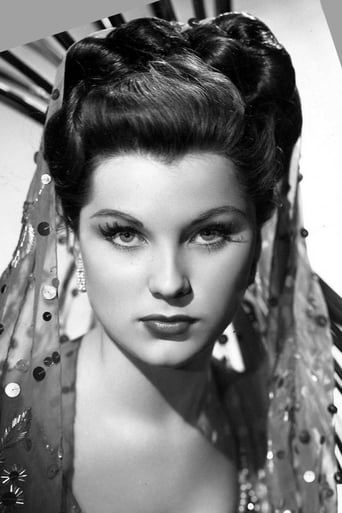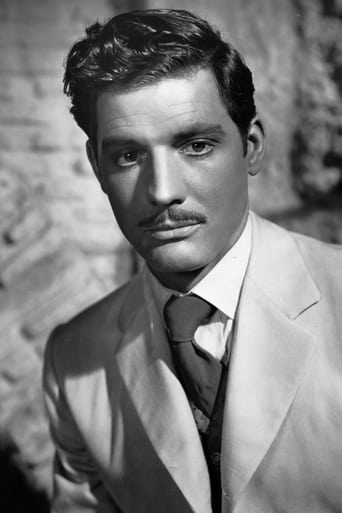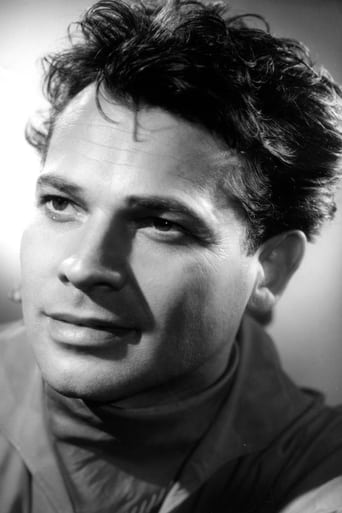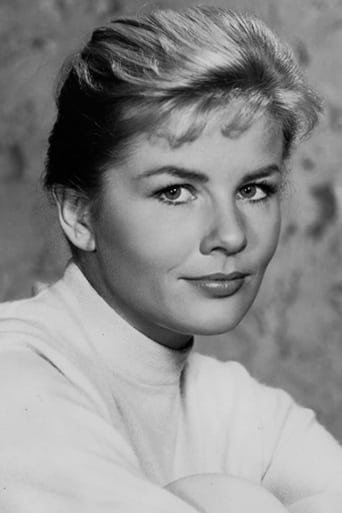MamaGravity
good back-story, and good acting
ClassyWas
Excellent, smart action film.
filippaberry84
I think this is a new genre that they're all sort of working their way through it and haven't got all the kinks worked out yet but it's a genre that works for me.
Philippa
All of these films share one commonality, that being a kind of emotional center that humanizes a cast of monsters.
ma-cortes
In Schnapur , there rules a powerful Maharajah called Chandra : Walter Reyel who falls in love for a beautiful temple-dancer : Debra Paget , who schemes to marry her despite fierce opposition from factions within his own court . But all his wealth and power has not prevented his sweetheart has a romance with an architect : Paul Christian . Both of whom flee from Eschnapur but are pursued by the Maharajah's soldiers . This sparks a coup of state which is eventually put down . The plot expands to build a huge tomb to imprison the girl who betrayed him but things go awry.Pretty good movie with huge budget for the time , colorful cinematography , luxurious palaces as well as spectacular outdoors . It deals with a moving loving triangle triggering the Maharajah's vengeful ire and in the midst there are several fights , escapes , snakes , tigers and the Goddess Shiva . Here stands out the gorgeous Debra Paget who performs spectacular and erotic dances . It packs an emotive and thrilling musical score by from Gerhard Becker and Michel Michelet . Glamorous photography by Richard Angst , shot on location in India and in German studios , though being necessary a perfect remastering , that is why the film copy is washed-out . This is a remake from the silent original also directed by Fritz Lang with Conrad Veidt , Paul Ritter , and Mia May . This ¨Tiger of Schanapur¨ is the first part , being followed by a second installment titled ¨The Indian tomb¨ . Both of them were merged for US as ¨Journey to the Lost City¨ delivered by American International Pictures , it results to be a poorly edited hybrid of the two Lang movies.The motion picture scripted by Thea Von Harbou , Lang's wife , was lavishly produced by Arthur Brauner . And it was well directed by Fritz Lang who also made another classic adventure movie : ¨Moonfleet¨ . Lang directed various prestigious silent movies as ¨Metrópolis¨ , ¨Woman in the moon¨ , ¨Doctor Mabuse¨ , ¨Spies¨ , ¨Spiders¨ , ¨Nibelungs¨ ; noir films : ¨Beyond a reasonable doubt¨, ¨While city sleeps¨ , ¨The big heat¨ , ¨Clash night¨ ; Drama : ¨Woman in the Window¨ , ¨Human Desire¨ , ¨Scarlet Street¨ , ¨Fury¨ ; Western : ¨Rancho notorious¨ , ¨Western Unión¨ , ¨Revenge of Frank James¨.
Horst in Translation (filmreviews@web.de)
Fritz Lang is one of those directors who managed the transition from silent film to sound film, even if most people will probably argue that his best works come from the days when there was still intertitles in films to tell us what the characters were saying. "Der Tiger von Eschnapur" is one of the last films of Lang and he was already in his late 60s when he made this one and it's actually a remake of a film that Lang already made considerably earlier in his career. This is also why Thea von Harbou, a couple years dead already by 1959, is listed as the writer. She also worked on the script of the original black-and-white films. This one here is in color and the first 100 minutes from a duology that continues with "Das indische Grabmal", another 1959 film. The cliffhanger ending also indicates this.I personally did not enjoy the watch too much. It starts off fairly solid, the characters are interesting, but sadly it does not stay this way for the entire film. I quickly lost interest in the story of an architect falling in love with a dancer, a woman that the local Maharajah also has an interest in. It's a tale about love, power and deceit, but it's nowhere near as good as it could have been. Looks like Lang already had his best days behind him and I cannot say I have a whole lot of interest in seeing the sequel, although I probably will soon and I hope it's actually 100 minutes that are improved to the 100 minutes we have here. As for the 1959 version of "The Tiger of Eschnapur", I do not recommend watching it unless you're a Lang completionist. It's not a failure, but also it's not a good film. Thumbs down. Oh yeah and a quick note about the cast. Do not be fooled by the characters in the film and the dark skin makeup because pretty much the entire cast is German. of course the clean speaking with no accents in this film also gives them away.
MartinHafer
"Der Tiger von Eschnapur" is a film about a German architect who is brought to India to work for the Maharajah of Enschnapur (a fictitious kingdom). Along the way, he exercises very poor judgment and falls in love with a half-caste (Debra Paget) and they both risk their lives if they act upon this love. And so, naturally, they do and the film ends with their fleeing for their lives. Exactly what happens next, you'll need to see in the second film in this series--"The Indian Tomb".I enjoyed "Der Tiger von Eschnapur". It was the sort of film that was like a throwback to the 1940s--to the films of Universal Studios. In many ways, it was a bit like "The Cobra Woman", "Thief of Bagdad" or a movie serial--full of action, romance and escapism. On the other hand, it certainly was not a great piece of art--more like a B-movie with a slightly higher budget and a nice locale. Plus, Miss Paget had one of the sexiest dance numbers I can recall having seen apart from Rita Hayworth's in "Gilda". However, to put it bluntly, it was a decent film but not good enough to enable the director, Fritz Lang, to be able to mount a comeback to his former greatness. But with small bad touches (one-dimensional characters and some bad special effects--such as the obviously stuffed tiger during the big climactic scene and the wooden-looking severed head), it certainly isn't a great work of art--more just Saturday matinée escapism and nothing more. But, frankly, sometimes that is all you need to have a bit of fun.
MARIO GAUCI
I was wary of purchasing Fantoma's 2-Disc Set of "Fritz Lang's Indian Epic" after being somewhat let down by the 1921 Silent original (co-scripted by Lang himself) and also its less-than-stellar reputation. For this reason, when the second part of the saga turned up on Italian TV a couple of years ago, I decided to check it out just the same so as to get an inkling of what to expect! I recall thinking it pretty kitschy and unworthy of Lang's enormous talent, but Fantoma's sale (through their website) of their entire DVD catalog a few months back made it an irresistible acquisition! Well, having now watched the entire saga (with dialogue and in color, as opposed to the rather static Silent version directed by Joe May - although hearing the Indian-garbed characters talking in German took some getting used to), I was pleasantly surprised by how genuinely engaging and sheerly enjoyable it all was! Though it was sold as an epic production (to the point of concluding ESCHNAPUR with the promise that Part II would feature greater thrills and even more spectacle) at a time when such films were all the rage, the saga was actually a pretty modest undertaking by eclectic (and prolific) German producer Artur Brauner. Despite the two films' exotic, handsome look (not least in the provocative dances of Debra Paget), the budgetary constraints were painfully obvious in the special effects department, especially the hilarious appearance of a 'ropey' cobra which is intended to 'test' (the scantily-clad) Miss Paget's faithfulness to the Maharajah!! All in all, even if these films hardly constitute Lang's greatest work (though he harbored an evident affection throughout his life for this particular tale, which was originally conceived by his former wife Thea von Harbou), they have great - and enduring - appeal for aficionados of old-fashioned, serial-like adventure stories tinged with romance and mysticism.Even so, while I don't subscribe to that school of thought myself, there are some film critics (Tom Gunning, Jean Douchet and Pierre Rissient among them) who think very highly of Lang's Indian diptych - the first considering it one of Lang's towering achievements and the last two numbering it among the ten greatest films of all time!!





